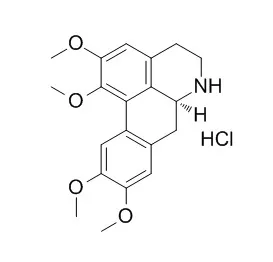Xylopia laevigata (Annonaceae), known locally as "meiú" or "pindaíba", is widely used in folk medicine in Northeastern Brazil.
METHODS AND RESULTS:
In the present work, we performed phytochemical analyses of the stem of X. laevigata, which led to the isolation of 19 alkaloids: (-)-roemerine, (+)-anonaine, lanuginosine, (+)-glaucine, (+)-xylopine, oxoglaucine, (+)-norglaucine, asimilobine, (-)-xylopinine, (+)-norpurpureine, (+)-N-methyllaurotetanine, (+)-norpredicentrine, (+)-discretine, (+)-calycinine, (+)-laurotetanine, (+)-reticuline, (-)-corytenchine, (+)-discretamine and (+)-flavinantine. The in vitro cytotoxic activity toward the tumor cell lines B16-F10 (mouse melanoma), HepG2 (human hepatocellular carcinoma), K562 (human chronic myelocytic leukemia) and HL-60 (human promyelocytic leukemia) and non-tumor peripheral blood mononuclear cells (PBMCs) was tested using the Alamar Blue assay. Lanuginosine, (+)-xylopine and (+)-norglaucine had the highest cytotoxic activity. Additionally, the pro-apoptotic effects of lanuginosine and (+)-xylopine were investigated in HepG2 cells using light and fluorescence microscopies and flow cytometry-based assays. Cell morphology consistent with apoptosis and a marked phosphatidylserine externalization were observed in lanuginosine- and (+)-xylopine-treated cells, suggesting induction of apoptotic cell death. In addition, (+)-xylopine treatment caused G₂/M cell cycle arrest in HepG2 cells.
CONCLUSIONS:
These data suggest that X. laevigata is a potential source for cytotoxic alkaloids. |






 Cell. 2018 Jan 11;172(1-2):249-261.e12. doi: 10.1016/j.cell.2017.12.019.IF=36.216(2019)
Cell. 2018 Jan 11;172(1-2):249-261.e12. doi: 10.1016/j.cell.2017.12.019.IF=36.216(2019) Cell Metab. 2020 Mar 3;31(3):534-548.e5. doi: 10.1016/j.cmet.2020.01.002.IF=22.415(2019)
Cell Metab. 2020 Mar 3;31(3):534-548.e5. doi: 10.1016/j.cmet.2020.01.002.IF=22.415(2019) Mol Cell. 2017 Nov 16;68(4):673-685.e6. doi: 10.1016/j.molcel.2017.10.022.IF=14.548(2019)
Mol Cell. 2017 Nov 16;68(4):673-685.e6. doi: 10.1016/j.molcel.2017.10.022.IF=14.548(2019)